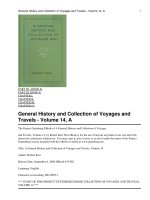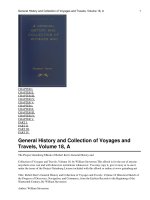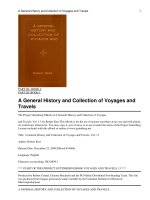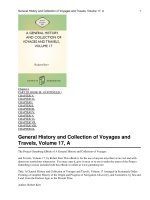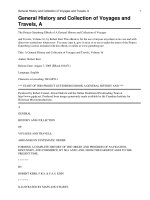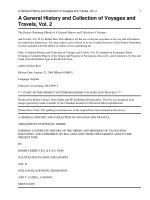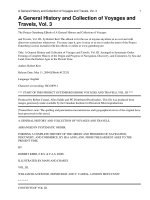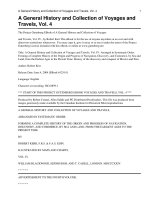The History and Antiquities of the Doric Race, Vol. 2 of 2 pdf
Bạn đang xem bản rút gọn của tài liệu. Xem và tải ngay bản đầy đủ của tài liệu tại đây (1.2 MB, 593 trang )
The History and Antiquities of the Doric
by Karl Otfried Müller
The Project Gutenberg EBook of The History and Antiquities of the Doric
Race, Vol. 2 of 2 by Karl Otfried Müller
This eBook is for the use of anyone anywhere at no cost and with almost no restrictions whatsoever. You may
copy it, give it away or re-use it under the terms of the Project Gutenberg License included with this eBook or
online at />Title: The History and Antiquities of the Doric Race, Vol. 2 of 2
Author: Karl Otfried Müller
Release Date: September 28, 2010 [Ebook #34010]
Language: English
Character set encoding: ISO 8859-1
***START OF THE PROJECT GUTENBERG EBOOK THE HISTORY AND ANTIQUITIES OF THE
DORIC RACE, VOL. 2 OF 2***
The History and Antiquities
Of The
The History and Antiquities of the Doric by Karl Otfried Müller 1
Doric Race
by Karl Otfried Müller
Professor in the University of Göttingen
Translated From the German by
Henry Tufnell, Esq.
And
George Cornewall Lewis, Esq., A.M.
Student of Christ Church.
Second Edition, Revised.
Vol. II
London:
John Murray, Albemarle Street.
1839.
CONTENTS
Book III. Political Institutions Of The Dorians.
The History and Antiquities of the Doric by Karl Otfried Müller 2
Chapter I.
Chapter I. 3
Chapter II.
Chapter II. 4
Chapter III.
Chapter III. 5
Chapter IV.
Chapter IV. 6
Chapter V.
Chapter V. 7
Chapter VI.
Chapter VI. 8
Chapter VII.
Chapter VII. 9
Chapter VIII.
Chapter VIII. 10
Chapter IX.
Chapter IX. 11
Chapter X.
Chapter X. 12
Chapter XI.
Chapter XI. 13
Chapter XII.
Book IV. Domestic Institutions, Arts, And Literature Of The Dorians.
Chapter XII. 14
Chapter I.
Chapter I. 15
Chapter II.
Chapter II. 16
Chapter III.
Chapter III. 17
Chapter IV.
Chapter IV. 18
Chapter V.
Chapter V. 19
Chapter VI.
Chapter VI. 20
Chapter VII.
Chapter VII. 21
Chapter VIII.
Chapter VIII. 22
Chapter IX.
Appendices. Appendix V. On the Doric Dialect. Appendix VI. Chronological Tables. Index. Footnotes
BOOK III. POLITICAL INSTITUTIONS OF THE DORIANS.
Chapter IX. 23
Chapter I.
§ 1. End of a state according to the Doric notions. § 2. Difference between the political institutions of the
Dorians and Ionians. § 3. Successive changes in the constitutions of the Greek states; 1st, royal aristocracy of
the heroic ages. § 4. 2nd, Timocracy, or aristocracy of wealth. § 5. 3rd, Tyranny. § 6. 4th, Democracy. § 7.
Form of government characteristic of the Doric race. § 8. Supposed legislation of Lycurgus. § 9. Derivation of
Spartan laws from the Delphic oracle. § 10. Characteristics of the Doric form of government.
1. Before we speak of the form of government which prevailed in the Doric states, it will be necessary to set
aside all modern ideas respecting the origin, essence, and object of a state; namely, that it is an institution for
protecting the persons and property of the individuals contained in it. We shall approach nearer to the ancient
notion, if we consider the essence of a state to be, that by a recognition of the same opinions and principles,
and the direction of actions to the same ends, the whole body become, as it were, one moral agent. Such an
unity of opinions and actions can only be produced by the ties of some natural affinity, such as of a nation, a
tribe, or a part of one: although in process of time the meaning of the terms state and nation became more
distinct. The more complete the unity of feelings and principles is, the more vigorous will be the common
exertions, and the more comprehensive the notion of the state. As this was in general carried to a wider extent
among the Greeks than by modern nations, so it was perhaps nowhere so strongly marked as in the Dorian
states, whose national views with regard to political institutions were most strongly manifested in the
government of Sparta. Here the plurality of the persons composing the state was most completely reduced to
unity; and hence the life of a Spartan citizen was chiefly concerned in public affairs. The greatest freedom of
the Spartan, as well as of the Greeks in general, was only to be a living member of the body of the state;
whereas that which in modern times commonly receives the name of liberty, consists in having the fewest
possible claims from the community; or in other words, in dissolving the social union to the greatest degree
possible, as far as the individual is concerned. What the Dorians endeavoured to obtain in a state was good
order, or {~GREEK SMALL LETTER KAPPA~}{~GREEK SMALL LETTER OMICRON WITH
OXIA~}{~GREEK SMALL LETTER SIGMA~}{~GREEK SMALL LETTER MU~}{~GREEK SMALL
LETTER OMICRON~}{~GREEK SMALL LETTER FINAL SIGMA~}, the regular combination of different
elements. The expression of king Archidamus in Thucydides,(1) that "it is most honourable, and at the same
time most secure, for many persons to show themselves obedient to the same order ({~GREEK SMALL
LETTER KAPPA~}{~GREEK SMALL LETTER OMICRON WITH OXIA~}{~GREEK SMALL LETTER
SIGMA~}{~GREEK SMALL LETTER MU~}{~GREEK SMALL LETTER OMICRON~}{~GREEK
SMALL LETTER FINAL SIGMA~})," was a fundamental principle of this race. And hence the Spartans
honoured Lycurgus so greatly, as having instituted the existing order of things ({~GREEK SMALL LETTER
KAPPA~}{~GREEK SMALL LETTER OMICRON WITH OXIA~}{~GREEK SMALL LETTER
SIGMA~}{~GREEK SMALL LETTER MU~}{~GREEK SMALL LETTER OMICRON~}{~GREEK
SMALL LETTER FINAL SIGMA~}):(2) and called his son by the laudatory title of Eucosmus.(3) For the
same reason the supreme magistrate among the Cretans was called Cosmus; among the Epizephyrian
Locrians, Cosmopolis. Thus this significant word expresses the spirit of the Dorian government, as well as of
the Dorian music and philosophy.(4) With this desire to obtain a complete uniformity, an attempt after
stability is necessarily connected. For an unity of this kind having been once established, the next object is to
remove whatever has a tendency to destroy it, and to repress all causes which may lead to a change: yet an
attempt to exclude all alteration is never completely successful: partly on account of the internal changes
which take place in the national character, and partly because causes operating from without necessarily
produce some modifications. These states, however, endeavour to retain unchanged a state of things once
established and approved; while others, in which from the beginning the opinions of individuals have
out-weighed the authority of the whole, admit, in the progress of time, of greater variety, and more
innovations, readily take up whatever is offered to them by accident of time and place, or even eagerly seek
for opportunities of change. States of this description must soon lose all firmness and character, and fall to
pieces from their own weakness; while those which never admit of innovation will at last, after having long
stood as ruins in a foreign neighbourhood, yield to the general tide of human affairs, and their destruction is
commonly preceded by the most complete anarchy.
Chapter I. 24
2. This description expresses, though perhaps too forcibly, the difference between the Doric and Ionic races.
The former had, of all the Grecians, the greatest veneration for antiquity; and not to degenerate from his
ancestors was the strongest exhortation which a Spartan could hear:(5) the latter, on the other hand, were in
everything fond of novelty, and delighted in foreign communication; whence their cities were always built on
the sea, whereas the Dorians generally preferred an inland situation. The anxiety of the Dorians, and the
Spartans in particular, to keep up the pure Doric character and the customs of their ancestors, is strongly
shown by the prohibition to travel,(6) and the exclusion of foreigners, an institution common both to the
Spartans and Cretans, and which has been much misrepresented by ancient authors.(7) It is very possible, as
Plutarch thinks, that the severity of these measures was increased by the decline of all morals and discipline,
which had arisen among the Ionians from the contrary practice; that race having in the earliest times fallen
into a state of the greatest effeminacy and inactivity, from their connexion with their Asiatic neighbours. For
how early was the period when the ancient constitution of the Grecian family degenerated among the Ionians
into the slavery of the wife! how weak, effeminate, and luxurious do their ancient poets Callinus(8) and
Asius(9) represent them! and if the legend describes even the daughters of Neleus, the founder of the colony,
as completely destitute of morality,(10) what must have been the condition of this people, when the wives of
the Ionians had mixed with Lydian women! The warning voice of such examples might well stimulate the
ancient lawgivers to draw in with greater closeness the iron bond of custom.
3. But with all this difference in the races of which the Grecian nation consisted, there was, in the
development of the constitutions of the Greek states, a common progress, which extended a certain influence
even to such as retained their earlier impressions with a firm adherence to antiquity. As it is our present object
to give a general view of this advance, we will begin with the constitution of the heroic age, so clearly
described in Homer. This can scarcely be called by any other name than that of aristocracy, as its most
important feature is the accurate division between the nobles(11) and the people. The former composed the
deliberative councils, and the courts of justice;(12) and although both were commonly combined with a public
assembly ({~GREEK SMALL LETTER ALPHA WITH PSILI~}{~GREEK SMALL LETTER
GAMMA~}{~GREEK SMALL LETTER OMICRON~}{~GREEK SMALL LETTER RHO~}{~GREEK
SMALL LETTER ALPHA WITH VARIA~}), the nobles were the only persons who proposed measures,
deliberated and voted; the people was only present in order to hear the debate, and to express its feelings as a
body; which expressions might then be noticed by princes of a mild disposition.(13) The chief ruler himself
was properly of equal rank with the other nobles, and was only raised above them by the authority intrusted to
him as president in the council, and commander in the field. This form of government continued to exist for a
considerable time in the Ionian, Achæan, and Æolian states; but the power of the chief ruler gradually
declined, and was at last wholly abolished. With the Dorians, however, the case was very different; they were
peculiar in possessing a very limited nobility, for the Heraclidæ had nearly an exclusive right to that
appellation: while, on the other hand, a whole nation occupied by means of conquest, a station analogous to
that of an aristocracy, uniting military pursuits with independence obtained by the possession of the land.
4. About the 30th Olympiad (660 B.C.), however, on account of the increased trade and intercourse with
foreign nations, and consequently of the greater demand for luxuries, the value of wealth rose in comparison
with the honour of noble descent. The land, indeed, still remained for the most part in the hands of the
aristocracy; but as it had at this time become more easy to dissipate an inherited estate, and to obtain
consideration by the profits of trade, property was more exposed to sudden changes. It is probable that the
Geomori of the Ionic Samos, as well as the Hippobotæ of Chalcis (which, as well as Samos, had once
belonged to Ionians), whose distinction was derived from the possession of land, also carried on the extensive
commerce of these two states; otherwise the wealth of the merchant would soon have exceeded that of the
landowner. In the Doric states also, which were much engaged in trade, such as Corinth, Ægina, &c., it was
attempted to unite the government of hereditary aristocracy and of wealth.(14) The new importance attached
to wealth, even at the time of the Seven Sages, gave rise to the saying of Aristodemus the Argive, "Money
makes the man;"(15) and at a later period Theognis the Megarean complains that the pursuit of riches
confounds all distinction of rank, and that estimation was derived from it.(16) The ancient legislators of
Greece considered the power of money, or moveable property (which is as changeable as property in land is
Chapter I. 25


